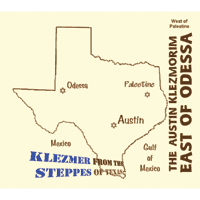Austin Klezmorim /
East of Odessa—West of Palestine

Austin Klezmorim
East of Odessa
BA Music, 1994
Tel: 361-215-7163
Web: www.bamusic.net/klez
E-mail Austin Klezmorim
Available from cdbaby.com
About two years ago, someone in the WELL's music conference posted a short note one afternoon in the "What I'm listening to now" section about a band that was giving this particular listener considerable aural satisfaction, "The Austin Klezmorim." The person wasn't even Jewish. Or a klez fan. He'd just wound up at a concert, been blown away, and bought the CD. Then, this spring I was actually in Austin, and found people at the conference I was attending had actually heard of, and loved the band. By then I had actually found a copy at the Bay Area's treasure, "Down Home Music," source of great music from around the world, even Austin :-).
There's a lot of neat music here. Along with the New Orleans Klez AllStars, this is regional American klezmer the way I like it best. The traditional klez is there, and well-played. The opening number, "Birobidjan," is delightfully sung and played. Whichever of the vocalists sings on this particular number is perfect. You can also hear hints of Bob Wills and Texas swing in the background. This isn't greenhorn music, it's assimilated, strongly klez, strongly Jewish, but also very Texan. (I should qualify this by noting that the Yiddish vocals usually betray no trace of Texas accent, for which I am most grateful. Only on "Tum Balalaika" does it sound as though the vocalist doesn't have a clear idea of what Yiddish sounds like.) For the most part, the repertoire runs the gamut of klez and Jewish folk: "Sha Shtil" and "Tum Balalaika" slip nicely in with a bulgar and "Vi Azoy Trinkt a Kayser Tey" ("This is how the Tzar drinks tea"), and the lovely, haunting closing song, "Wu Sannen Mein Sieben Gute Yohr." ("Where did my seven good years go"—a reference to the seven good years in Joseph's dream interpretation for Pharoah. I should note that I initially hesitated to post a translation. In 2003, eight years after this was posted, Yosef Rosenblatt saw this review and sent in his own translation, the one used here. The Internet is amazing.)
The gem of the album, and what I will probably pull it out mostly for, is "The Big Megillah," the story of Purim as told by a Jewish Lord Buckley, to a perfect jazz (definitely not klez) background. This isn't how the megilla had it, exactly, but things might have been different if the megilla had been written by someone slightly more hip. I doubt if I'll ever hear the name "Esther" again, without thinking about the original's "cool curves and dark eyes and the groovy way she dug the beauty and hipness of life." Uncle Mort plays a big role, too: "He's up there with Bird and Miles and the Mezzzzz." What can I say. This is something else, something else very, very good.
May the Austin Klezmorim come to a town near you (and me!) soon.
Reviewed by Ari Davidow, 7/3/95
Personnel this recording:
Bill Averbach: trumpet, arranger, leader
Mike Maddux: accordion
Howard Kalish: violin
Randy Zimmerman: trombone
Jay Rozen: tuba
Mark Rubin: tuba, banjo, bass
David Levy: drums, spoons, other eating utensils
Suzanna Sharpe: vocal
Rachel Rhodes: vocal
Songs
- Birobidjan
- Losin Gayn*
- Bulgar in d minor
- Sha Shtil!
- Zeltser Vasser*
- A Laibedika Honga--A Lively Honga
- Bayt Zhe Mir Oys A Finfuntsvantsiker
- The Big Megillah*
Download the words to The Big Megillah from the Lord Buckley web site - Tum Balalaika
- #29 -- Lechayim
- Roszenkes Mit Mahndlin
- Vi Azoy Trinkt a Kayser Tey
- Wu Sannen Mein Sieben Gute Yohr

